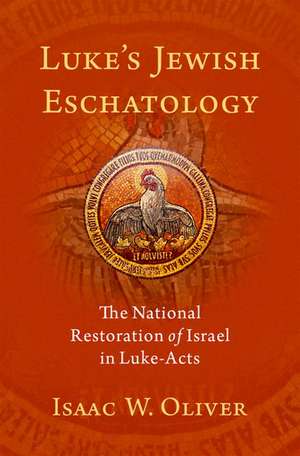Luke's Jewish Eschatology: The National Restoration of Israel in Luke-Acts
Autor Isaac W. Oliveren Limba Engleză Hardback – 26 aug 2021
Preț: 558.34 lei
Preț vechi: 638.63 lei
-13% Nou
Puncte Express: 838
Preț estimativ în valută:
106.85€ • 111.14$ • 88.21£
106.85€ • 111.14$ • 88.21£
Carte tipărită la comandă
Livrare economică 04-10 aprilie
Preluare comenzi: 021 569.72.76
Specificații
ISBN-13: 9780197530580
ISBN-10: 0197530583
Pagini: 300
Dimensiuni: 173 x 251 x 20 mm
Greutate: 0.57 kg
Editura: Oxford University Press
Colecția OUP USA
Locul publicării:New York, United States
ISBN-10: 0197530583
Pagini: 300
Dimensiuni: 173 x 251 x 20 mm
Greutate: 0.57 kg
Editura: Oxford University Press
Colecția OUP USA
Locul publicării:New York, United States
Recenzii
In this insightful study, Oliver challenges common readings of Luke's soteriology to propose a nuanced and historically grounded way of reading the duology...As the "parting of the ways" becomes increasingly dissolved in the study of Jewish and Christian origins, taking other unsustainable dichotomies with it, Oliver contributes an important rethinking of Lukan eschatology.
He has clearly produced a book that makes a tremendous contribution to Luke--Acts studies. He has adequately defended a position concerning the redemption of Israel and gospel studies, and I highly encourage Luke--Acts scholars to add this to their collection.
Those curious to know of early Christianity and the Jewish exile under the Roman occupation of Palestine would profit much from this book, and, some theological background will make the reading fruitful.
Oliver is to be thanked for giving us a substantive volume on Lucan eschatology. The recovery of this lost theme with its corrective does NT study a great service.
Finally, a volume that appreciates Luke's ongoing interest in the salvation of the Jewish people, continuing concern for the promises to David, and both the particularistic and universalistic implications of Jewish theology. Oliver offers not only a brilliant corrective to the anti-Jewish implications of much of Luke-Acts scholarship but also an engagingly written, fully documented historical analysis.
Isaac Oliver presents a powerful and well-substantiated reading of Luke-Acts as a Jewish text where the restoration of Israel as a collective and concrete event is never out of sight. Luke-Acts is seen as expressing eschatological hopes for all Israel and all creation, that is, explicitly Jewish hopes for the universal dimension of God's intervention. Isaac Oliver convincingly argues that the resurrection of the Davidic Messiah Jesus is not the climax of this intervention but a stage in the eschatological events, with all Israel and all of creation living in hope and anticipation of what is still to come. An indispensable reading for scholars and students alike, this study paves a substantial pathway for further conversations over interpretations of these first century texts of Jewish tradition.
What Isaac Oliver did for Luke's legal reasoning in his 2013 Torah Praxis after 70 CE, he now does for Luke's eschatology in this excellent book: He makes sense of it within the Judaism of that crucial period between the destruction of the temple and the ascendancy of the rabbis. Oliver shows how Luke-Acts, despite its manifestly being a piece of Graeco-Roman literature, speaks fluently the language of ancient Jewish restoration eschatology. A welcome addition to a conflicted field of research.
This book deserves a wide-ranging and respectful reception.
He has clearly produced a book that makes a tremendous contribution to Luke--Acts studies. He has adequately defended a position concerning the redemption of Israel and gospel studies, and I highly encourage Luke--Acts scholars to add this to their collection.
Those curious to know of early Christianity and the Jewish exile under the Roman occupation of Palestine would profit much from this book, and, some theological background will make the reading fruitful.
Oliver is to be thanked for giving us a substantive volume on Lucan eschatology. The recovery of this lost theme with its corrective does NT study a great service.
Finally, a volume that appreciates Luke's ongoing interest in the salvation of the Jewish people, continuing concern for the promises to David, and both the particularistic and universalistic implications of Jewish theology. Oliver offers not only a brilliant corrective to the anti-Jewish implications of much of Luke-Acts scholarship but also an engagingly written, fully documented historical analysis.
Isaac Oliver presents a powerful and well-substantiated reading of Luke-Acts as a Jewish text where the restoration of Israel as a collective and concrete event is never out of sight. Luke-Acts is seen as expressing eschatological hopes for all Israel and all creation, that is, explicitly Jewish hopes for the universal dimension of God's intervention. Isaac Oliver convincingly argues that the resurrection of the Davidic Messiah Jesus is not the climax of this intervention but a stage in the eschatological events, with all Israel and all of creation living in hope and anticipation of what is still to come. An indispensable reading for scholars and students alike, this study paves a substantial pathway for further conversations over interpretations of these first century texts of Jewish tradition.
What Isaac Oliver did for Luke's legal reasoning in his 2013 Torah Praxis after 70 CE, he now does for Luke's eschatology in this excellent book: He makes sense of it within the Judaism of that crucial period between the destruction of the temple and the ascendancy of the rabbis. Oliver shows how Luke-Acts, despite its manifestly being a piece of Graeco-Roman literature, speaks fluently the language of ancient Jewish restoration eschatology. A welcome addition to a conflicted field of research.
This book deserves a wide-ranging and respectful reception.
Notă biografică
Isaac W. Oliver (PhD, University of Michigan) is an associate professor at the Department of Philosophy & Religious Studies, Bradley University. Oliver has edited and published several works on ancient Judaism, Christianity, and Islam, including, Torah Praxis after 70 CE: Reading Matthew and Luke-Acts as Jewish Texts (Mohr Siebeck, 2013).
